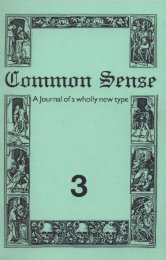i on thomas paine reviews: origins of crisis in ussr - Common Sense
i on thomas paine reviews: origins of crisis in ussr - Common Sense
i on thomas paine reviews: origins of crisis in ussr - Common Sense
You also want an ePaper? Increase the reach of your titles
YUMPU automatically turns print PDFs into web optimized ePapers that Google loves.
Page 46 Comm<strong>on</strong> <strong>Sense</strong> - Issue 15<br />
c<strong>on</strong>ceptual start<strong>in</strong>g po<strong>in</strong>t. This is because that which asserts itself to the ec<strong>on</strong>omic m<strong>in</strong>d<br />
as 'objectivity', or 'objective logic', or 'objective be<strong>in</strong>g' is, <strong>in</strong> Marx, understood as<br />
alienated subjectivity (as specified <strong>in</strong> Backhaus, 1992). Labour is an alienated subject by<br />
virtue <strong>of</strong> its social existence as a producer <strong>of</strong> a perverted world. This means that the<br />
practical-critical activity <strong>of</strong> labour exists aga<strong>in</strong>st itself as itself <strong>in</strong> the form <strong>of</strong> the<br />
fetishised world <strong>of</strong> capitalism. The c<strong>on</strong>stituti<strong>on</strong> <strong>of</strong> the world occurs beh<strong>in</strong>d the backs <strong>of</strong><br />
the <strong>in</strong>dividuals; yet it is their work' (Marcuse. 193711988, p. 151). In other words. the<br />
reality i:~ which humans move day <strong>in</strong> and day out has no <strong>in</strong>variant character, that is,<br />
someth<strong>in</strong>g which exists <strong>in</strong>dependently from them. It is the social practice <strong>of</strong> labour which<br />
c<strong>on</strong>stitutes, suffuses and c<strong>on</strong>tradicts the perverted world <strong>of</strong> capitalism. Labour does not<br />
exist 'external' to perverted forms. Rather, 'perverted form', <strong>in</strong>clud<strong>in</strong>g capital's 'cajol<strong>in</strong>g<br />
power', exist <strong>in</strong> and through labour's social practice. Thus 'subject and object do not<br />
statically oppose each other, but rather are caught up <strong>in</strong> an "<strong>on</strong>go<strong>in</strong>g process" <strong>of</strong> the<br />
"<strong>in</strong>versi<strong>on</strong> <strong>of</strong> subjectivity <strong>in</strong>to objectivity, and vice versa"' (Backhaus, 1992. p. 60<br />
referr<strong>in</strong>g to K<strong>of</strong>ler). Understand<strong>in</strong>g the c<strong>on</strong>stituti<strong>on</strong> <strong>of</strong> perverted forms <strong>in</strong> this way makes<br />
it possible to see the generic as <strong>in</strong>herent <strong>in</strong> the specific, and the abstract as <strong>in</strong>herent <strong>in</strong> the<br />
c<strong>on</strong>crete (see Man;. 1973, Intro.). This view <strong>in</strong>volves a way <strong>of</strong> th<strong>in</strong>k<strong>in</strong>g which moves<br />
with<strong>in</strong> the object (i.e. the social-historical form <strong>of</strong> human relati<strong>on</strong>s) <strong>of</strong> its th<strong>in</strong>k<strong>in</strong>g.<br />
Dialectics does not proceed to its object from outside but from <strong>in</strong>side. Dialectical th<strong>in</strong>k<strong>in</strong>g<br />
attempts to appropriate c<strong>on</strong>ceptually the c<strong>on</strong>tradictory mode <strong>of</strong> existence c<strong>on</strong>stituted by,<br />
and c<strong>on</strong>stitutive <strong>of</strong>, social practice. Dialectical th<strong>in</strong>k<strong>in</strong>g c<strong>on</strong>ceptualises itself with<strong>in</strong>, and<br />
as a moment <strong>of</strong>, its object (Gunn, 1989, 1992). Such a c<strong>on</strong>ceptualisati<strong>on</strong> <strong>of</strong> social<br />
existence seeks an understand<strong>in</strong>g <strong>of</strong> the apparently isolated facts <strong>of</strong> life as compris<strong>in</strong>g a<br />
mode <strong>of</strong> existence <strong>of</strong> social relati<strong>on</strong>s. Dialectics emphasises the unity-<strong>in</strong>-difference as<br />
between structure and struggle. It does so <strong>on</strong> the basis <strong>of</strong> the understand<strong>in</strong>g that 'all social<br />
relati<strong>on</strong>s are essentially practical' and that these social relati<strong>on</strong>s comprise the c<strong>on</strong>stitutive<br />
practical-critical activity <strong>of</strong> labour.<br />
Any c<strong>on</strong>ceptualisati<strong>on</strong> <strong>of</strong> 'capital' which focuses <strong>on</strong> its seem<strong>in</strong>gly formal logic (as <strong>in</strong><br />
structuralism) disregards the dist<strong>in</strong>ctiveness <strong>of</strong> Marx's theory and espouses. <strong>in</strong>stead, the<br />
reified world <strong>of</strong> capitalism as the object and purpose <strong>of</strong> theory. Further, any<br />
c<strong>on</strong>ceptualisati<strong>on</strong> which focuses merely <strong>on</strong> labour's aut<strong>on</strong>omy h m capital disregards the<br />
historically specific form <strong>of</strong> labour's existence and espouses, <strong>in</strong>stead, a subjectivist<br />
understand<strong>in</strong>g <strong>of</strong> the <strong>on</strong>tological c<strong>on</strong>stituti<strong>on</strong> <strong>of</strong> existence to be found - apparently - <strong>in</strong> the<br />
subjectivity <strong>of</strong> be<strong>in</strong>g which c<strong>on</strong>stantly escapes the grasp, and which threatens a<br />
revoluti<strong>on</strong>ary disposal <strong>of</strong> 'capital'. In other words, human practice is seen as a self-<br />
c<strong>on</strong>stitut<strong>in</strong>g and immediate power, a power which 'capital' has but c<strong>on</strong>stantly fails to<br />
subvert. In dist<strong>in</strong>cti<strong>on</strong> to the <strong>on</strong>tological c<strong>on</strong>cepti<strong>on</strong> <strong>of</strong> labour, the present paper argues<br />
that it is human practice which produces the perverted world <strong>of</strong> capital. It is the<br />
c<strong>on</strong>tradictory unity <strong>of</strong> the relati<strong>on</strong> between human practice as comrn&ied work <strong>in</strong> and<br />
through class which c<strong>on</strong>stitutes society <strong>in</strong> terms <strong>of</strong> a c<strong>on</strong>t<strong>in</strong>uous displacement and rec<strong>on</strong>-<br />
stituti<strong>on</strong> <strong>of</strong> the 'enchanted and perverted world' <strong>of</strong> capitalism (Marx, 1966, p. 830). The<br />
c<strong>on</strong>stituti<strong>on</strong> <strong>of</strong> social practice as capitalist reproducti<strong>on</strong> presents the c<strong>on</strong>crete substance <strong>of</strong><br />
class antag<strong>on</strong>ism. The removal <strong>of</strong> 'capital' <strong>in</strong>to the museum <strong>of</strong> history can go forward<br />
<strong>on</strong>ly through the revoluti<strong>on</strong>is<strong>in</strong>g <strong>of</strong> laboufs existence as the alienated subject which<br />
produces capital.<br />
The social relati<strong>on</strong> which c<strong>on</strong>stitutes the mode <strong>of</strong> existence/movement <strong>of</strong> labour <strong>in</strong><br />
capitalist society is the relati<strong>on</strong> between necessary labour and surplus labour, that is, the<br />
class antag<strong>on</strong>ism <strong>of</strong> capital and labour which c<strong>on</strong>stitutes the social work<strong>in</strong>g day. The<br />
capitalist mode <strong>of</strong> existence <strong>of</strong> labour is characterised by the c<strong>on</strong>t<strong>in</strong>uous compulsi<strong>on</strong> to



